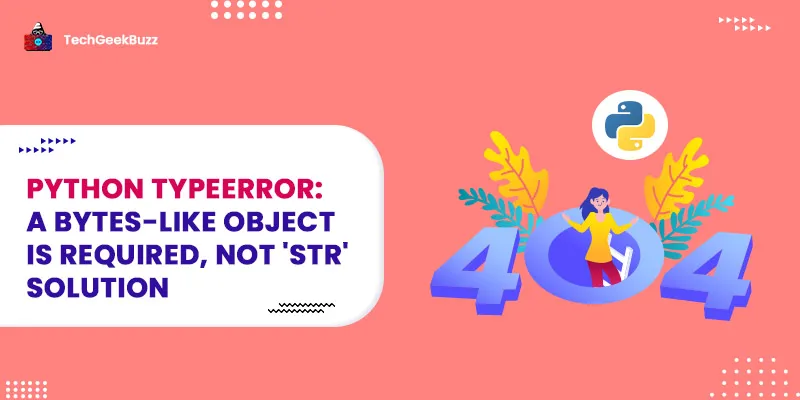With the Python
in
operator, we can find whether or not a data object or item is present in a list, tuple, string, dictionary, set, and byte. The byte data type represents a sequence of characters that has a byte value from range 0 to 256.
To initialize a byte value, we can either use the byte() function or
b
prefix before the string data value. But if we operate the
in
operator between the string object and a byte object, the Python will raise the
TypeError: a bytes-like object is required, not an 'str'
Error.
In this Python guide, we are going to talk about the following error reason and its solution with the help of examples. And by the end of this tutorial, you will have a complete idea of how to fix this error in a Python program. Let's begin with the reason for this error.
Python Error: TypeError: a bytes-like object is required, not 'str'
In Python, we have a similar syntax to represent the string and the byte data.
For example,
string = "Hello World"
byte_data = b"Hello World"
print(string) #Hello World
print(byte_data) #b'Hello World'
To represent byte data in Python, we just put the
b
prefix before the string value. Although both data values of string and byte look the same, Python treats them very differently. And if we try to perform the string operation on a byte data, we receive the TypeError.
And one of the common examples is when we perform the
in
operator between the string and byte object. Byte object does support the
in
operator, but if we try to check a string character inside a byte data object using
in
operator, Python will throw the
TypeError: a bytes-like object is required, not 'str'
Error.
Error Example
#initialize byte object
byte_message = b'Hello World!'
#check if H in byte_message (error)
print('H' in byte_message)
Output
Traceback (most recent call last):
File "main.py", line 5, in
print('H' in byte_message)
TypeError: a bytes-like object is required, not 'str'
Error Reason
Python stores byte data characters as individual ASCII code values. If we try to access byte code data using indexing, we receive the character ASCII code.
Example
>>> a = b"Hello World"
>>> a[0]
72
Here
72
is the ASCII code value of
H
. Similarly, Python assigns an ASCII code value to every byte code data type value. And when we use a string value to check if it is present in the byte data, Python throws the error.
Error Statement Analysis
The Error statement TypeError: a bytes-like object is required, not 'str' has two sub-error statements.
- TypeError
- a bytes-like object is required, not 'str'
The Error statement has a TypeError exception because we are performing an invalid operation between a string and a byte type. The error message " a bytes-like object is required, not 'str' ", is telling us that it was expecting a bytes-like data type object, and we have used a string.
Solution
If we want to check if a character is present in a byte object, use the
in
operator. We need to convert that character into byte code.
#initialize byte object
byte_message = b'Hello World!'
#check if byte H in byte_message
print(b'H' in byte_message) #True
Common Example Scenario
Now let's discuss an example scenario where you may encounter this error. You will only encounter this error when you are dealing with byte data and performing the
in
operation between a string and a byte of data.
Example
Suppose you have a
page39.txt
file, and you want to check if the word
conspiracy
present in that file.
word = "conspiracy"
#open file and read the data
with open("page39.txt", "rb") as file:
data = file.read()
if word in data:
print(f"Word {word} present in file page39")
else:
print(f"Could not find the word {word} in page39")
Output
Traceback (most recent call last):
File "main.py", line 7, in
if word in data:
TypeError: a bytes-like object is required, not 'str'
Error Reason
In the above example, we are reading the file in binary mode
open("data.txt", "rb")
, and in binary mode, Python reads the file data as the byte, not the string. The
data
in the above example has the data type of byte, and when we tried to check the string
word
in byte
data
we received the error.
Solution
To solve the error, all we need to do is load the
page39.txt
file in
r
mode, which will read the file as a string.
word = "conspiracy"
#open file and read the data
with open("page39.txt", "r") as file:
data = file.read()
if word in data:
print(f"Word {word} present in file page39.txt")
else:
print(f"Could not find the word {word} in page39.txt!")
Output
Word conspiracy present in file page39.txt
Now our code runs successfully.
Conclusion
The Error "TypeError: a bytes-like object is required, not 'str'" occur in a Python program when we use a string object with a byte object and perform an operation between them. A common case is when we read a file in binary mode and treat that byte data as a string.
If you are stuck in this error, you can share your code and query in the comment section.
People are also reading:
- Print without Newline in Python
- Python TypeError: ‘>’ not supported between instances of ‘str’ and ‘int’ Solution
- Invalid Syntax Python
- Python TypeError: can only join an iterable Solution
- Round Whole Numbers in Python
- Python Absolute Value
- Exponent in Python
- Python FileNotFoundError: [Errno 2] No such file or directory Solution
- How to Sort a Dictionary by Value in Python?
- Python KeyError: A Complete Guide




